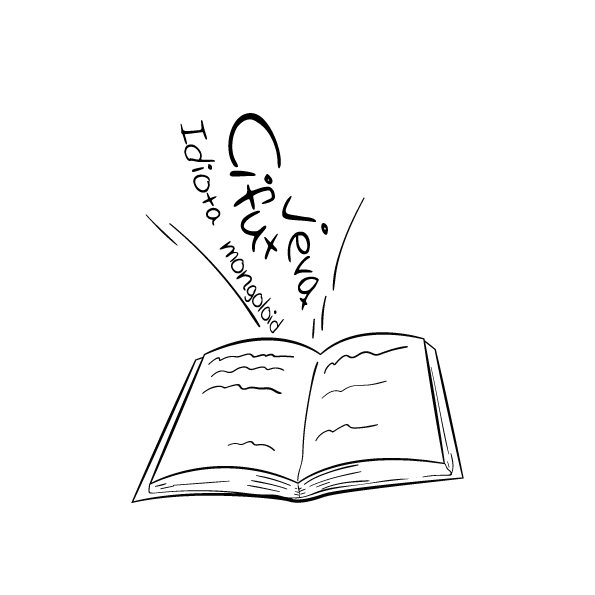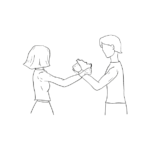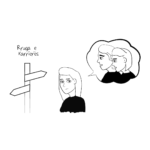DISCRIMINATIVE LANGUAGE AND MISINFORMATION IN SCHOOL LITERATURE
One of the big problems that causes obstacles in the teaching and learning process is the low quality level of school literature. Primary and high school books are constructed in a bad way, they contain discriminative language toward certain contingencies of individuals/at the expense of individuals, they have misinformation, unnecessary and overly repetitive information. They also lack examples and illustrations of certain concepts and also do not fulfill any necessary criteria to be qualified as credible literature.
Illustration: Argjira Kukaj

It can be said without hesitation that education is one of the primary premises of a contemporary and successful state. Without qualitative education there also isn’t any economic development, nor proper leadership or an aware and contemporary population
The education field in Kosovo has a lot of problems and discrepancies that should be solved. Unsatisfactory infrastructure, incompetent staff, undisciplined students are some of the factors that have brought the level of education to where it is, and consequently have a negative impact in other fields such as economics and its’ small development.
One of the big problems that causes obstacles in the teaching and learning process is the low quality level of school literature. Primary and high school books are constructed in a bad way, they contain discriminative language toward certain contingencies of individuals/at the expense of individuals, they have misinformation, unnecessary and overly repetitive information. They also lack examples and illustrations of certain concepts and also do not fulfill any necessary criteria to be qualified as credible literature.
This situation doesn’t seem to be improving because even though this literature is republished almost every year, it doesn’t go through any substantial contextual change. The biggest change the books receive after being republished is a cover change.
First of all, the way a certain subject is explained in teaching literature doesn’t achieve the right level of comprehension to the students, because in many cases (such as in 11th grade Geography book for example) irrelevant information is repeated and has unnecessary information that overfill the learning materials only to make it look more voluminous.
In scientific subjects’ texts there is a lack of examples and a deeper elaboration of more complex concepts that are necessary for the easement of the students’ learning. Also, examples and assignments given don’t have comprehensive explanations, and have a lack of orientation for the student. This last one isn’t valid only for scientific subjects. There is also a lack of explanation for the given assignments no further than in primers, and when most of the assignments are incomprehensible for the teacher and parent, the student shouldn’t even be mentioned.
This not only prevents learning the material, but also entices mechanical, non- logical and systematic learning from the student.
The worst is that there are many cases when the information given in the book is wrong. In 6th grade geography book it is said that Russia’s population is around 300 million, when in reality it has a population of only 144 million people. The compilers of the text could be forgiven if they had mistaken it for tens of thousands of people, but if the mistake is this large, it results in misinformation on every student and reader. Imagine a student who is learning from their geography textbook, and is trying to learn something that is wrong. Apart from all of these contextual problems in the school literature, discriminative language which is found in the texts also exists. Labeling, prejudice, offensive and non-adequate language in books on an ethnicity basis, races, physical and mental problems and religions is identified over 100 times from Youth Initiative for Human Rights in their study on school literature in the state of Kosovo.
Texts such as the Biology, Psychology and History have a content and discourse that has a tendency to present women as inferior and as a sexual object, or at least the way in which the sentences are articulated gives off that impression. But regardless of this, they should be changed. In the 11th grade Psychology textbook an unfair differentiation between men and women is created on the subject “Sexuality and Gender”, where in brain differences between the two genders it is said that “… both brains are connected in a different way: the male’s brain is for doing and the female one for talking.” And further that “…the brain differentiated as male has it easier to face many tasks, for example talking while building something.
There are also cases of labeling on the basis of disabilities, where people with mental and physical difficulties are referred to with primitive and offensive slurs in the literature. In four different texts of biology for the 10-12th grades this syndrome is defined as “mongoloid idiot”. It goes even further in this aspect by writing that “…such people, because of the appearance of their face and eyes, resemble the mongoloid race, whilst they have a large intellectual disability, with shortened growth, reduced brain, distinct characteristic and live no more than 10-15 years”.
There are also implications of marginalization in certain contingencies of the population, by not mentioning them when needed, and labeling them with derogatory. For example, in the 11th grade History textbook the term “gypsies” is used for Roma people and “Jews” for Hebrews.
Also, an excessive subjective glorification of the Albanian people is notices in all of the History book publications. Albanians there are represented with an “unshakable trust in their forces”, or how Skanderbeg died “covered in eternal glory.” Even though this could be considered as an attempt to heighten feelings of patriotism in the students- and a cautious glorification to a certain point is necessary for enticing patriotic values- it’s still a push toward an imposed ideology to the reader and has outdated, communist propagandistic tendencies. This can result in the creation of an incorrect point of view to the reader and/or the student.
A proper school textbook shouldn’t be a subject of gender, ethnic or racial discrimination. It should be an example of equality, tolerance and solidarity between people.
By taking an example of foreign publications of school textbooks, such as those of OXFORD Publishing, school subjects’ textbooks should always take into consideration the principle of objectivity, every topic that may be personal and touch within the spiritual realm/world of humans should be treated with objectivity so as to avoid offending certain people.
Elaboration of the material in a subjective way-or siding toward one end of the table- can result in something worse. By creating a ready idea in the individual and pushing them toward dogmatism, subjective books can be turned into manifests of social and cultural radicalism. This is the last thing that a place like Kosovo needs, a place which aims to integrate into contemporary circles.
Secondly, to create credible literature, almost everything should start from the beginning, the text’s construct, examples and content in general. Employing a more competent staff to compile the texts and taking examples from foreign publishers while recreating the literature is more than necessary to realize it. I’m not proposing for us to create copies of world literature as is our custom, but to base our model on theirs.
If these criteria are fulfilled, then educational literature can be improved, and consequently education in Kosovo can further be developed and avoid regression.
Proper educational literature is one of the main criteria to have a qualitative educational system. It can help a lot in concise/precise understanding of the learning materials and consequently can improve the level of students’ achievements in Kosovo’s institutions.
About the author: Lum Borovci is a 16 year old boy who attends high school studies.
This activity is supported by Engagement for Equity Program – E4E, financed by United States Agency for International Development – USAID, and implemented by Advocacy Training and
Resource Center –ATRC.


